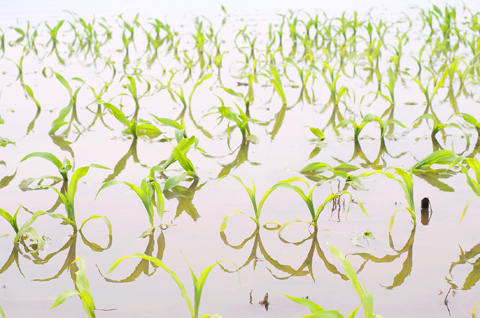Corn climbed to a record near US$8 a bushel as floods damaged crops in the US, the largest producer and exporter, threatening global food supplies.
The flooding may be the worst in the Midwest since 1993 and will probably cause “hundreds of millions of dollars” of damage, the National Weather Service said.
US corn stockpiles may fall 53 percent to a 13-year low before next year’s harvest, the US Department of Agriculture said on June 10.

PHOTO:AFP
Record crude oil, wheat, rice and soybean prices this year have driven inflation, forcing governments to increase interest rates as the economy slows and raising production costs. Food and fuel costs have eclipsed the credit squeeze as the greatest threat to the world economy, the G8 said.
“Inflation pressures are building around the world,” stoked by food and fuel prices, David Cohen, director of Asian economic forecasting at Action Economics in Singapore, said by phone yesterday. That’s “squeezing household budgets, especially the poorest, and company profits.”
Corn gained as much as 3.5 percent to US$7.9150 a bushel in Chicago and has advanced 33 percent in the past two weeks. It’s up 86 percent in the past year on record demand for biofuels and livestock feed as rising Asian incomes increase meat consumption.
High food prices “are here to stay” as governments divert resources to make biofuels, amass stockpiles and limit exports, Peter Brabeck-Letmathe, chairman of Nestle SA, the world’s largest food company, said in an interview in Kuala Lumpur yesterday.
“Elevated commodity prices, especially of oil and food, pose a serious challenge to stable growth worldwide, have serious implications for the most vulnerable and may increase global inflationary pressure,” G8 finance ministers said in a statement released after a meeting in Osaka, Japan, on Saturday.
Consumer prices last month probably rose the most since 1997 in the UK and the fastest in 16 years in the euro area, while US producer prices are predicted to have gained 1 percent from April, according to economist forecasts.
More thunderstorms were expected on Sunday in the US Midwest, Accuweather.com forecast. As much as 30cm of rain dropped in the Midwest last week, and some fields had five times the normal moisture since the end of last month, the National Weather Service said.
Meanwhile, Argentine farmers intensified protests against higher export taxes after a farm leader was arrested by police, threatening to spark food shortages and halt the flow of grains in the country. Farmers began their fourth strike in three months on Sunday, withholding crops and blocking roads.
The country is the world’s third-largest soybean exporter behind the US and Brazil, and second only to the US for corn.

In his National Day Rally speech on Sunday, Singaporean Prime Minister Lawrence Wong (黃循財) quoted the Taiwanese song One Small Umbrella (一支小雨傘) to describe his nation’s situation. Wong’s use of such a song shows Singapore’s familiarity with Taiwan’s culture and is a perfect reflection of exchanges between the two nations, Representative to Singapore Tung Chen-yuan (童振源) said yesterday in a post on Facebook. Wong quoted the song, saying: “As the rain gets heavier, I will take care of you, and you,” in Mandarin, using it as a metaphor for Singaporeans coming together to face challenges. Other Singaporean politicians have also used Taiwanese songs

NORTHERN STRIKE: Taiwanese military personnel have been training ‘in strategic and tactical battle operations’ in Michigan, a former US diplomat said More than 500 Taiwanese troops participated in this year’s Northern Strike military exercise held at Lake Michigan by the US, a Pentagon-run news outlet reported yesterday. The Michigan National Guard-sponsored drill involved 7,500 military personnel from 36 nations and territories around the world, the Stars and Stripes said. This year’s edition of Northern Strike, which concluded on Sunday, simulated a war in the Indo-Pacific region in a departure from its traditional European focus, it said. The change indicated a greater shift in the US armed forces’ attention to a potential conflict in Asia, it added. Citing a briefing by a Michigan National Guard senior

CHIPMAKING INVESTMENT: J.W. Kuo told legislators that Department of Investment Review approval would be needed were Washington to seek a TSMC board seat Minister of Economic Affairs J.W. Kuo (郭智輝) yesterday said he received information about a possible US government investment in Taiwan Semiconductor Manufacturing Co (TSMC, 台積電) and an assessment of the possible effect on the firm requires further discussion. If the US were to invest in TSMC, the plan would need to be reviewed by the Department of Investment Review, Kuo told reporters ahead of a hearing of the legislature’s Economics Committee. Kuo’s remarks came after US Secretary of Commerce Howard Lutnick on Tuesday said that the US government is looking into the federal government taking equity stakes in computer chip manufacturers that

US President Donald Trump on Friday said that Chinese President Xi Jinping (習近平) told him China would not invade Taiwan while Trump is in office. Trump made the remarks in an interview with Fox News, ahead of talks with Russian President Vladimir Putin over Moscow’s invasion of Ukraine. “I will tell you, you know, you have a very similar thing with President Xi of China and Taiwan, but I don’t believe there’s any way it’s going to happen as long as I’m here. We’ll see,” Trump said during an interview on Fox News’ Special Report. “He told me: ‘I will never do